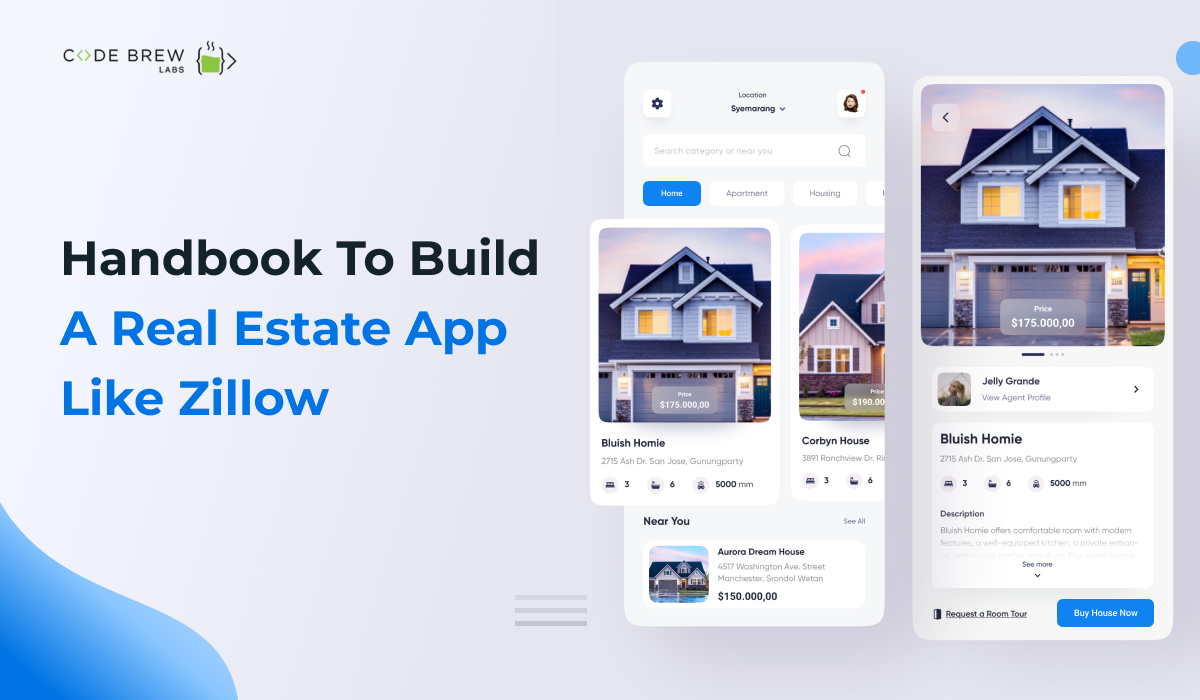
Considering that housing is one of the most essential basic human needs, the Zillow real estate app has been a huge sigh of relief for renters, agents, buyers, and sellers across the world. It is a commercial real estate marketplace app that empowers users with information about the real estate segment. Further, it easily connects the customers with the best local professionals who can help them with anything related to homes.
Table of Contents
Zillow and its affiliates offer customers an on-demand experience for selling, buying, renting, and financing properties with complete price transparency.
The real estate app offers buyers several listing options to choose from. It has a massive database of 110 million U.S. properties, which include homes for rent, & sale, and homes that are currently in foreclosure or make me move status. Moreover, it’s free to list a home for sale by owner or by the agent and even to list a property for rent. Its Zestimates feature offers an estimate of home values based on publicly available information.
And that’s not all! The Zillow smartphone app users can search and view property value estimation for free. You can only find a million reasons why Zillow is an ideal real estate marketplace to replicate.
Read on to get a detailed insight into all the crucial aspects of creating a real estate app like Zillow.
Zillow empowers people with its tools–Zillow Contact Manager, Zillow Digs, & Zillow Tech Connect, etcetera–& information to make wise decisions about their homes regardless of whether they’re buyers, sellers, renters, or borrowers.
To simplify this job for its millions of visitors every month, Zillow categorizes the properties into four major segments:
People using Zillow can find properties for sale by filtering them on various parameters like the agent, the owner, foreclosure, new construction, and those that are going to be listed soon.
This segment includes properties that can be available for purchase in the future. The type of properties in this category are:
For certain properties, homeowners fail to pay the mortgage. These properties go for foreclosure auction.
Such properties are in the early stage of repossession as the property owner is unable to pay an outstanding mortgage obligation.
The homeowners enlist some properties to check the market demand and gauge potential interest without officially listing the property for sale. These properties come under the ‘Make Me Move’ category.
This category includes buildings and apartments for rent across the U.S. Moreover, the Zillow Rental Manager service enables landlords to accept applications and rent payments through Zillow.
While the service is free for landlords, renters have to pay a $29 fee.
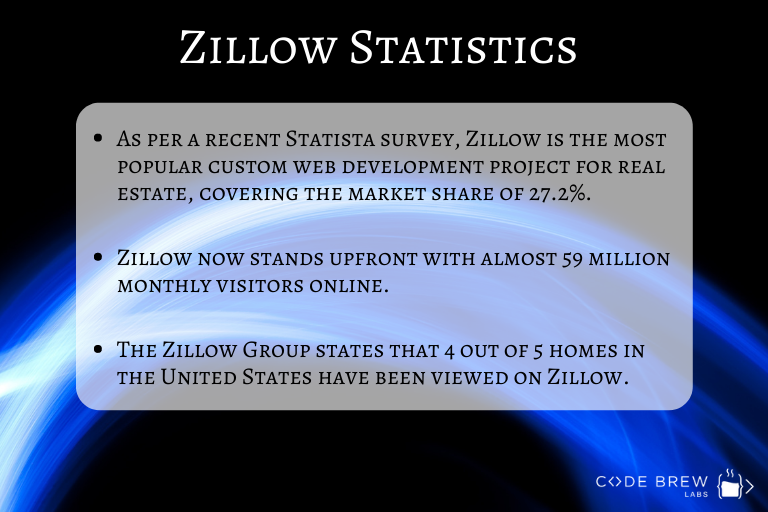
If you want to create your own real estate app like Zillow, it is important to know how real estate app owners earn revenue.
Along the same lines, you must be wondering how the company stakeholders are able to offer all these services for free and still make money.
Here’s how:
Zillow charges property management companies to advertise their listings on the Zillow Rental Manager, which includes websites from Zillow, Trulia, and HotPads.
It also sends qualified leads (prospective renters) to these advertisers to help them maximize the ROI on their advertising money.
This remains Zillow’s main source of revenue. The company also offers Premier Agent branding on its website, which includes multiple listing services, client reviews, bios, past sales, photos, and videos.
Real estate agents can also purchase advertising with Zillow. Ads targeted at users in agents’ local markets help them get new clients who are buying or selling homes. The ads also give agents increased visibility for their listings to help them find buyers.
The Premier Agent program further provides agents with a customer relationship management system that helps them track Zillow users who have expressed interest in working with an agent.
It is a real estate technology trend wherein the transaction is streamlined to make it quicker and easier for sellers, thanks to automation.
Customers use the online platform to send Zillow details of their homes to prospective buyers. The company responds with a cash offer within days. The customer can either accept Zillow’s offer, list their home with a local agent that Zillow connects them to, or choose not to sell at all.
Zillow also sells advertising space on its site to mortgage lenders and other businesses that want to reach Zillow consumers. These other businesses include home organization retailers, interior designers, and general contractors.
Most of these advertisers are in the real estate industry. But some sell telecommunications services, automotive products/ services, insurance, and consumer products.
The display revenue depends largely on the number of monthly unique visitors that Zillow receives.
Mortgage lenders mainly pay Zillow based on Cost Per Click or Cost Per Mille (CPM). A click means that after searching for mortgage rates, the user requests more information from a local lender. Meanwhile, an impression means that the ad appears on Zillow’s desktop or mobile site.
Note:
Zillow also earns money from the subscription-based mortgage software company Mortech, which is owned and operated by Zillow Group.
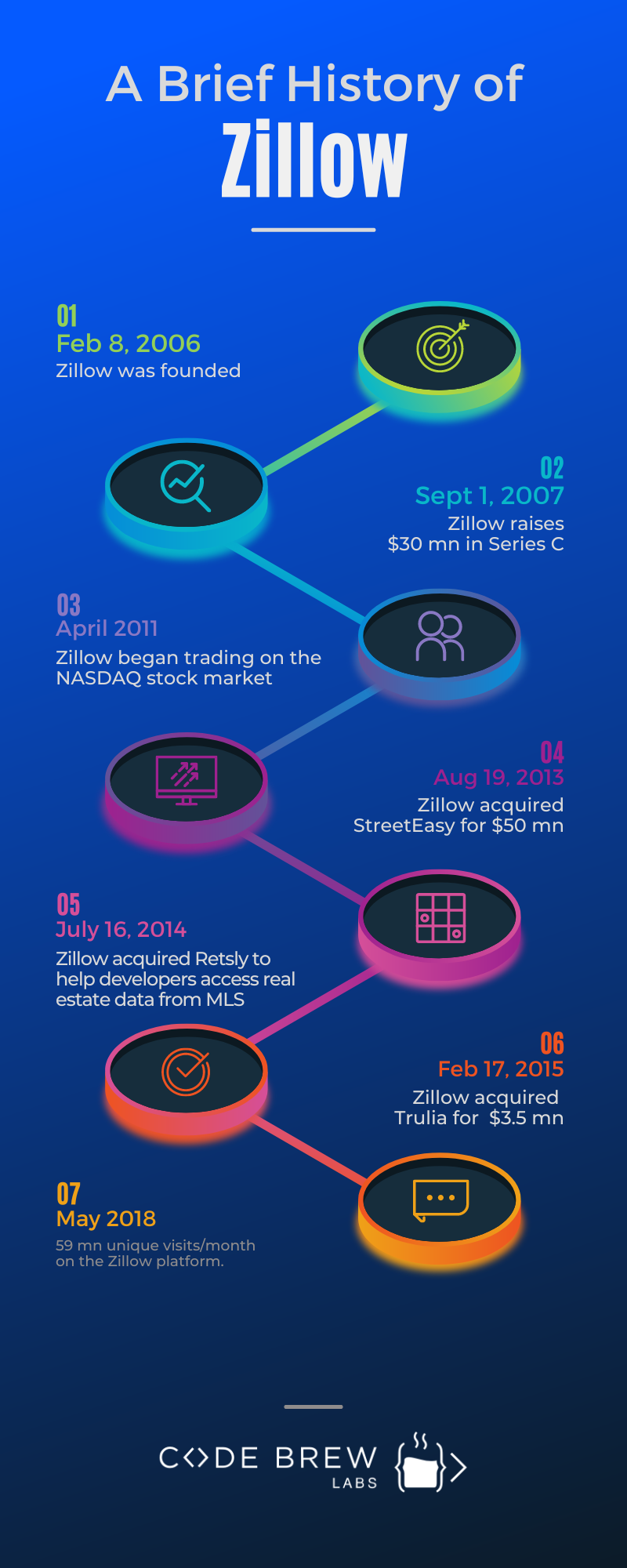
The team at Zillow connects buyers with trusted customer service-focused agents in their local markets through the Zillow Premier Agent program. Zillow Premier Agents must uphold customer experience standards in the areas of expertise, grievance resolution, and overall service quality.
Their affiliated lender, Zillow Home Loans provides mortgage pre-approvals and financing. Also, Zillow Closing Services – Zillow’s affiliated title and escrow provider–offers title and closing services.
For buyers, the company previously offered homes directly sold by Zillow through its Zillow Offers program. However, the program was shuttered down in November 2021.
Alternatively, buyers can buy homes directly from the owner, through foreclosures, or with the help of an agent (through the Zillow Premier Agent program).
Zillow Rentals make it easy for renters to search, request tours, apply for renting a property, and pay rent through the Zillow platform. Renters can submit applications through Zillow and proactively process their credit and background checks to streamline their application process.
The Zillow Rentals platform integrates with other property management back-end solutions, making the listing experience easier for landlords and/or property managers.
For renters, Zillow offers an array of features that help its users to find a new place to stay. Apart from browsing rental listings, users can also submit an application through Zillow to speed up the credit and background check process.
Besides, they can use its affordability calculator to determine their budget or pay online on the Zillow platform instead of using cheques.
Zillow provides home sellers with the right information, technology, and services. In this way, it creates a seamless real estate dealing experience to cope with today’s on-demand world.
Sellers can use their home’s Zestimate as a starting point to see the profit potential of selling. A Zillow representative then connects them with a local Zillow Premier Agent who does a competitive market analysis and consults on home improvements to maximize home value.
Zillow offers two options to sellers.
Zillow offers customers several options to pursue mortgage financing for their transactions.
Borrowers can shop around on Zillow’s affiliated online mortgage marketplace to find the best rate and mortgage provider when they buy or refinance.
Further, the firm partners with other lenders to offer loans on its mortgage marketplace. It also provides various tools such as a mortgage calculator to aid borrowers during the loan application process.
Consult only a premium real estate app development company to build a Zillow clone. After all, even a minor glitch in making the app can severely impact the user experience.
Now, coming on to the features. There are some must-have features that must absolutely be offered to the users, agents, and the admin.
Here are go-to features that a Zillow clone app offers:
User Registration
Customers can directly sign up on the platform via multiple options such as signing up through social accounts, which makes their onboarding process easier.
Instant Search
The platform includes an advanced search and filter option that enables users to find real estate properties that suit their budgets and requirements.
View Agent Info
On liking a property, users can view the respective real estate agent’s details including their contact details.
View Property Info
Users can have a quick property overview like built-up area, pricing, carpet area, 3D images/videos, etcetera.
The full details of properties like built-up area, pricing, carpet area, 3D images/videos etcetera are presented to give users a quick property overview.
Route Navigation
The in-built map navigation system provides users with the best-optimized route to reach the property in the shortest time.
Send Requests
Users who show an interest in buying a property can send a buying request to respective real estate agents and can wait for their response until they accept it.
Compare Requests
Users can compare several properties listed in a certain location to analyze their pricing, agent commission, property size, etcetera, helping them make informed choices.
Chat/Call Support
Users can readily reach out to real estate agents through chat support or call if they need any urgent assistance.
Secure Payments
Users can seamlessly process payments for the properties they wish to buy via payment options available in the Zillow clone app.
Ratings & Reviews
Users can rate the services of a real estate agent and share their feedback helping other users make informed decisions.
Sign Up
Real estate agents can register on the Zillow clone and set up their agent accounts with all the necessary details including contact information.
Add Commission
Agents can mention their commission fee in the property information so that users can quickly refer to them. They can edit their commission whenever they want to.
View User Info
Agents can view the details of potential buyers who show interest in the properties, along with their contact details.
Buyer Support
Attend to user queries in real-time by staying in touch with them via chat or call, ensuring they feel valued.
Promote Listings
Agents can boost the visibility of their properties by featuring them in premium listings. For this, they can subscribe to the ad packages as per their requirement.
View Earnings
Agents can keep track of their earnings from finalized deals on a weekly or monthly basis.
Instant Alerts
Agents are updated to receive notifications if users show interest in buying their properties or receive buying requests via instant push notifications.
Manage Listings
Agents can list properties with their complete details for the reference of potential buyers. They can edit or remove these properties at any time they want.
Intuitive Dashboard
The admin can manage all the activities of the Zillow clone app on the go with the assistance of the powerful admin dashboard.
Manage Users and Guests
The admin can manage the profiles of users and guests registered on the platform. The app allows the admin to ensure that the users abide by all the platform regulations.
Track Revenue
The admin can deduct the commission and forward the earnings to respective real estate agents. The overall revenue generated is presented in one convenient location.
Manage Ads
The admin can manage the promotion of property listings to increase their visibility among their prospective buyers, thus increasing sales.
Insightful Reports
The admin can get access to data-driven analytical reports periodically to analyze the app’s performance and reach.
Manage Properties
The admin can view and manage the property listings by the real estate agents, along with their complete information.
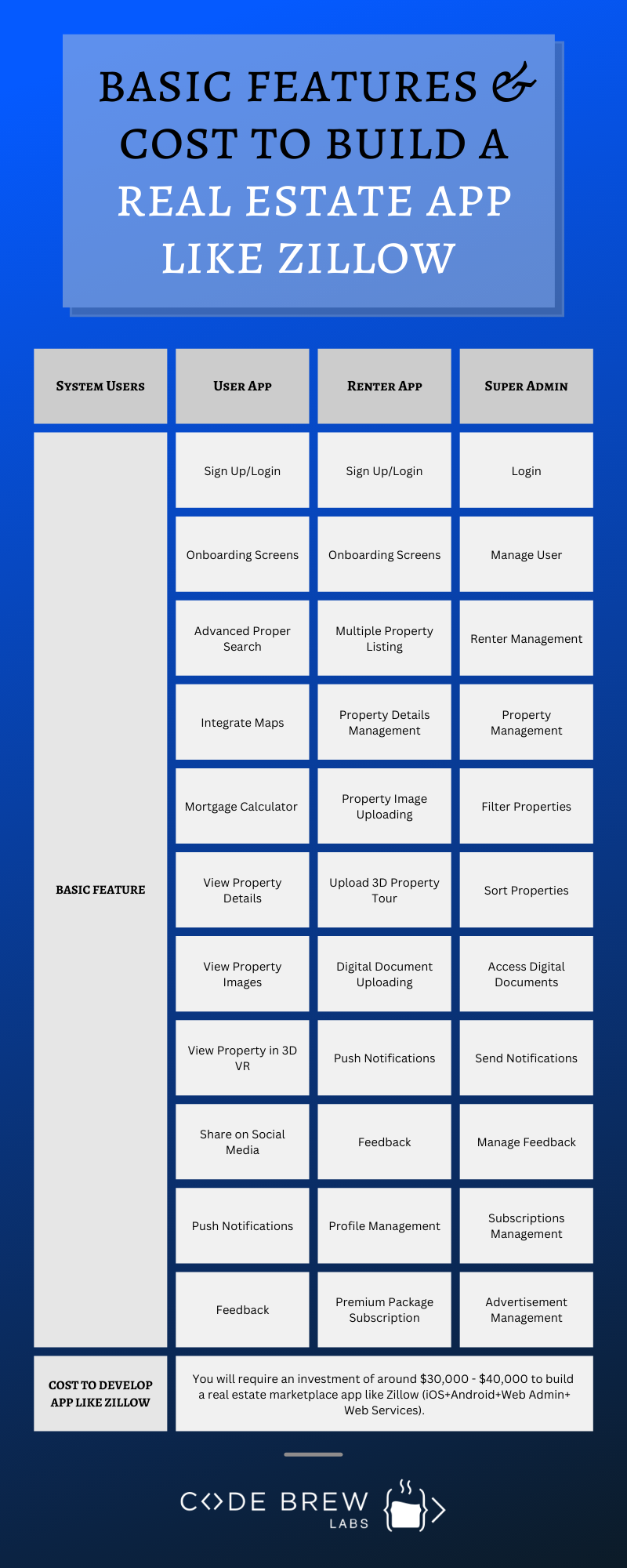
The overall cost depends on the type and number of features you include in the Zillow clone app. Below are the basic features affecting your real estate app development cost:
The more alternative sign-up/sign-in methods you offer, the easier it will be to navigate your app. Allow the users to sign up with social media profiles, Google+ accounts, or a biometric touchpoint.
And to verify the user’s identity, a two-step authentication mechanism has to be in place.
Let your users filter houses by price, number of rooms, and location. Trulia includes over 30 search filters. This offers the buyers a whole new level of flexibility.
One can sort rentals by whether the owners allow pets, by keyword, or by property type.
Did you know that photos are the most appreciated feature of real estate websites? That’s because they give the audience a realistic view of every apartment or house.
If you want to go a step further (and can afford it), you can add a 360-degree virtual tour and indoor videos of a particular building.
The idea is to provide in-detail data to users while encouraging them to use the platform. For example, the Trulia app includes data on 34 neighborhoods, including photos, stories from locals, and amenities.
So, users can check whether local schools fit their requirements, whether the community is friendly, and the level of crime through heatmaps.
Let users add their own properties for sale or rent seamlessly via the control panel. But, to build a home search app like Zillow, Multiple Listing Services must be integrated.
Through this feature, users can find the houses nearby displayed on the map. The geo-location uses GPS or Geotags to enable this search.
It helps track all your leads and sales via a single system. What’s more? It helps you get real-time analytics about them. Based on this data, you can then craft your marketing and promotional strategies.
In a heat map, you can use different colors to mark the areas with low, medium, or high levels of crime. You can also mark the risks of natural disasters, the infrastructure nearby, and the costs of properties across the regions.
Besides this, allow your users to choose the amount of information they want to see by selecting the search criteria.
Some apps let the users calculate the interest rates for a home loan. Others include a calculator of a property price based on the loan amount, taxes, and certain other factors.
Enable the users to close a deal by contacting a real estate agent directly via chat or call on the app. Let the agent know the online status of the interested party. Through online conversations, users can quickly get more details about a specific property.
As they swiftly move down to the sales funnel, it means more deals and faster closing.
Most people across all age groups are on social media platforms. So, it is vital that your commercial real estate marketplace app includes a social sharing feature too.
By using this feature, the sellers and agents can share a property listing on social media platforms and can capture more interest from the buyers.
You can also integrate push notifications to alert a user once an appropriate item appears.
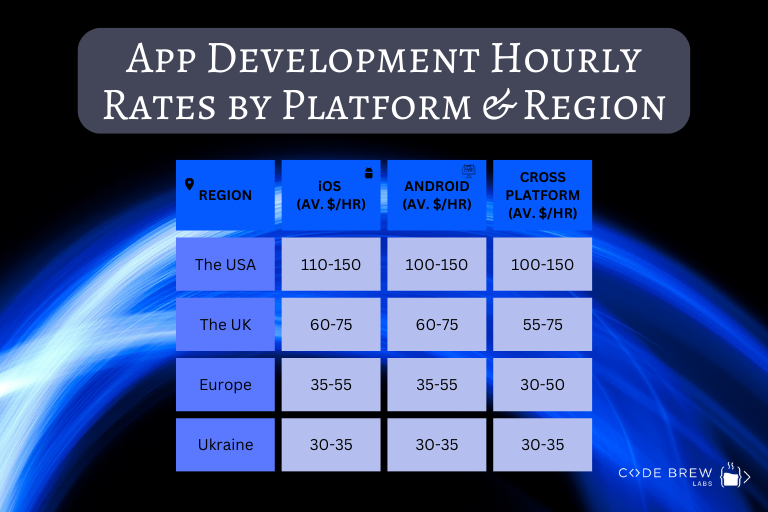
For your idea to work, these aspects of your Zillow clone must be in place:
You must ensure that users can easily browse properties through their smartphones. Next, see that the app’s geolocation feature is working properly so that users can make location-centric searches and find nearby places without any hassle.
Make sure that your users get instant notifications regarding a new property listing. Ensure that your customer support team is responsive and promptly resolves user queries.
Last but not least, it’s crucial that you create a specialized app for buying and selling property. This will help you stand out from the competition.
First is the agency app that belongs to specific real estate agencies. It specifies all the listed houses and their agents for easy access for the users.
Through it, the agency keeps track of its business improvements, how many clients are engaging with their agency, and what their demands are.
Next is the third-party app that works as the mediator between the buyers and the agents. Here, the users sign up either as buyers/sellers or freelancer agents.
The freelancing agents upload their own listings and expand their network through the app. Meanwhile, the user contacts the agents nearby, browses through their listings and looks for houses they are interested in.
The sellers sign up and contact the agents about the property they want to sell.
There are some core features in a Zillow clone that have already been mentioned above. These are login/signup, view/edit profile, filter & search, and Map view to name a few.
Use only high-resolution images and videos as the users will definitely look at them before making the final purchasing decision. Further, use maps & Heatmaps as it will improve the app aesthetically and elevate the user experience.
Also, avoid using too complicated terms and words for menus. The use of easy-to-understand terms for menus will help the users feel more comfortable with your app.
Next, the users shouldn’t have to scramble through your app to find what they are looking for. So, make sure that the transition from one point to another (navigation) on the real estate app is easy and smooth.
Lastly, add a 3D walkthrough and floor plans feature. It levels up the app’s user experience to a whole another level. Through it, buyers get an actual understanding of the floor plan, the house interiors, and whether it matches their requirements or not.
Here’s the tech stack you need to have before you create your own real estate app:
The most tried and tested monetization model is to showcase relevant ads on the app. Every time a user taps on the ads, you earn a small revenue. Also, implement various fees on your real estate app. For example:
Listing Fee
It is charged when a user wants to get their property listed.
Extra Fee
Agents pay these fees to boost their profile in order to get more clients.
But take care as having to pay a lot of fees will eventually annoy the users.
Further, give users the facility of a premium subscription so that they can use the app to its full extent.
All in all, a Zillow clone is a great business idea that will stay relevant not only in the present but also in the future. After all, with a loyal target audience, a convenient system to find clients and properties, and opportunities for better targeting, you can’t possibly go wrong.
In fact, an understated benefit of this idea–on the philanthropic side–is that it also protects all parties from fraud as the properties are heavily moderated.
Talking about ideas, we at Code Brew Labs love and look forward to all things apps. We build customized, robust mobile apps (iOS and android) across a wide range of industries.
What’s more? We deliver seamless mobile experiences within your budget.
So, if you have an idea about the real estate app you want, do not hesitate to reach out and discuss it with us. We’re here to make your idea a reality.
